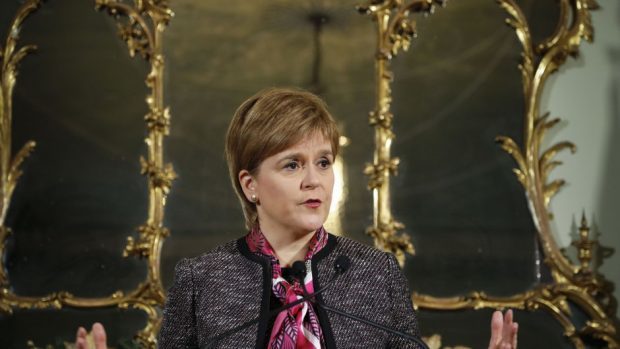Nicola Sturgeon has outlined her plans to keep Scotland in the single market in the wake of the EU referendum.
The first minister said she wanted to avoid a “devastating” hard Brexit – but critics have suggested the SNP leader is attempting to pave the way for a second ballot on independence.
Ms Sturgeon said that Scotland must retain access to the single market under any Brexit deal after the majority of Scots voted to remain in the EU in the June referendum.
She has also demanded a raft of new powers for the Scottish Parliament, including controls over immigration and the ability to strike deals with foreign governments.
Speaking at Bute House, Ms Sturgeon said her proposals are a “serious and genuine attempt” to “unify the country around a clear plan”.
But the SNP leader also reiterated that a second independence referendum “must remain on the table”.
The Scottish Government has firstly proposed the UK as a whole should stay in the single market by remaining “a party to the European Economic Area (EEA) agreement” and staying in the customs union.
A so-called “soft-Brexit” deal is “entirely democratically justifiable”, Ms Sturgeon said, although she conceded it seems an “unlikely outcome”.
The paper also outlines ways in which the Scottish Government believes Scotland could stay in the single market – through the European Free Trade Association (EFTA) and the EEA – even if the rest of the UK chooses to leave.
Membership of both EFTA and the EEA allows access to the single market, but also means accepting the free movement of people and paying into EU budgets.
Ms Sturgeon said: “A hard Brexit, taking us out of the EU and the single market, could have a devastating effect on jobs, investment and standards of living, with research suggesting up to 80,000 jobs lost in Scotland and earnings per head £2,000 lower after a decade.
“This paper from the Scottish Government is aimed at avoiding that outcome.
“Scotland’s Place in Europe is a set of proposals that are detailed and serious, but given the Scottish Government’s belief that independence within the EU is the best option for Scotland, they are also a significant compromise on our part.”
The first minister said Brexit represented a “serious constitutional change” since 2014 and without the option of separation “Scotland would simply have to accept the inevitability of whatever decisions the UK Government makes”.
She said she hoped Prime Minister Theresa May – who has pledged to consider the proposals – would demonstrate a “willingness to compromise”.
She added: “We want the UK Government to make clear when it triggers Article 50 that it intends to stay in the single market and customs union.
“If it will not do so, we want the UK Government to seek, as part of its negotiation, a differentiated solution for Scotland as set out (in the document).
“Everything about Brexit will be difficult and unprecedented. The negotiations ahead will be characterised by a need to find practical solutions to a range of complex issues.
“It is in that spirit that we seek to find solutions that will respect the voice and protect the interests of Scotland.”
A Downing Street spokeswoman said the government welcomed the Scottish paper and would “look closely” at it. It is expected to be discussed in detail when the UK Government and devolved administrations meet at the Joint Ministerial Committee in January.
But the spokeswoman made clear Theresa May is determined to deliver a UK-wide Brexit and did not believe there should be a second referendum on Scottish independence.
